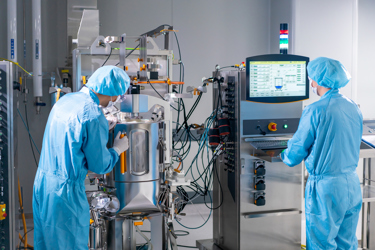Reducing The Cost: Advancing mRNA Vaccines And Therapeutics Through IVT Process Development And Scalable Manufacturing
By Chanhee Oh, Jinahn Choi, Haenaem Kwon, and Sungyul Lee, Samsung Biologics

Messenger RNA (mRNA) therapeutics have emerged as a versatile platform for next-generation treatments, with applications spanning infectious diseases, oncology, and rare genetic disorders. However, challenges such as low yield, high double-stranded RNA (dsRNA) content, and limited scalability have constrained their broader adoption. A next-generation in vitro transcription (IVT) platform has been developed to overcome these barriers by employing a rigorous, data-driven design of experiments (DoE) approach. This methodology identifies and optimizes key process parameters—such as plasmid DNA concentration, magnesium-to-NTP ratios, and enzyme levels—to maximize titer and purity while minimizing dsRNA levels.
The platform achieves titers exceeding 14–15 g/L, purity above 85%, and dsRNA levels below 0.01%, all while demonstrating robust scalability from microliter to Ambr 250 scales. Innovations include the use of modified T7 RNA polymerases and fed-batch processing strategies, enabling high capping efficiency and further cost reductions. These enhancements not only improve overall process performance but also reduce the cost of goods by up to 72%, supporting the commercial viability and global accessibility of mRNA-based therapies. Through validated scalability, enzyme engineering, and process optimization, the platform offers a reliable solution for advancing mRNA programs from preclinical development through to large-scale, GMP-compliant manufacturing.
Get unlimited access to:
Enter your credentials below to log in. Not yet a member of Outsourced Pharma? Subscribe today.
